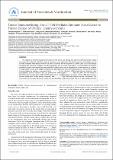Tumor Immunoediting, from T Cell-Mediated Immune Surveillance to Tumor-Escape of Uterine Leiomyosarcoma
Author(s)
Hayashi, Takuma; Horiuchi, Akiko; Sano, Kenji; Hiraoka, Nobuyoshi; Ichimura, Tomoyuki; Ishiko, Osamu; Kanai, Yae; Yaegashi, Nobuo; Aburatani, Hiroyuki; Shiozawa, Tanri; Tonegawa, Susumu; Konishi, Ikuo; ... Show more Show less
Downloadtumor-immunoediting-from-t-cell-mediated-immune-surveillance-to-tumor-escape-of-uterine-leiomyosarcoma-2157-7560.S1-002.pdf (1.508Mb)
PUBLISHER_CC
Publisher with Creative Commons License
Creative Commons Attribution
Terms of use
Metadata
Show full item recordAbstract
The majority of smooth muscle tumors found in the uterus are benign, but uterine leiomyosarcomas (LMSs) are extremely malignant, with high rates of recurrence and metastasis. The development of gynecologic tumors is often correlated with female hormone secretion; however, the development of uterine LMS is not substantially correlated with hormonal conditions, and the risk factors are not clearly understood. The presentation of antigenic peptides by major histocompatibility complex (MHC) class I molecules is important for tumor rejection by cytotoxic T-lymphocytes (CTLs). Such antigenic peptides are generated as a result of the degradation of intracellular proteins by the proteasome pathway, a process that is influenced by the interferon (IFN)-γ-inducible low molecular mass polypeptide-2 (LMP2) subunit of the 20S proteasome. Homozygous deficient mice for LMP2 are now known to spontaneously develop uterine LMS. LMP2 expression is reportedly absent in human uterine LMS, but present in human myometrium. Further studies revealed a few infiltrating CD56+ NK cells in human uterine LMS tissues. This review aims at summarizing recent insights into the regulation of NK cell function and the T cell-mediated immune system as tumor immune surveillance, first attempts to exploit NK cell activation to improve immunity to tumors.
Date issued
2012-02Department
Massachusetts Institute of Technology. Department of Biology; Picower Institute for Learning and MemoryJournal
Journal of Vaccines & Vaccination
Publisher
OMICS Publishing Group
Citation
Hayashi, Takuma. “Tumor Immunoediting, from T Cell-Mediated Immune Surveillance to Tumor-Escape of Uterine Leiomyosarcoma.” Journal of Vaccines & Vaccination (2012) © 2012 Hayashi T, et al
Version: Final published version
ISSN
2157-7560